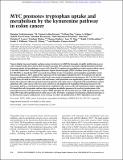| dc.contributor.author | Braverman, Jonathan | |
| dc.contributor.author | Yilmaz, Omer H. | |
| dc.date.accessioned | 2020-04-14T12:43:55Z | |
| dc.date.available | 2020-04-14T12:43:55Z | |
| dc.date.issued | 2019-08-15 | |
| dc.identifier.issn | 0890-9369 | |
| dc.identifier.issn | 1549-5477 | |
| dc.identifier.uri | https://hdl.handle.net/1721.1/124607 | |
| dc.description.abstract | Tumors display increased uptake and processing of nutrients to fulfill the demands of rapidly proliferating cancer cells. Seminal studies have shown that the proto-oncogene MYC promotes metabolic reprogramming by altering glutamine uptake and metabolism in cancer cells. How MYC regulates the metabolism of other amino acids in cancer is not fully understood. Using high-performance liquid chromatography (HPLC)-tandem mass spectrometry (LC-MS/MS), we found that MYC increased intracellular levels of tryptophan and tryptophan metabolites in the kynurenine pathway. MYC induced the expression of the tryptophan transporters SLC7A5 and SLC1A5 and the enzyme arylformamidase (AFMID), involved in the conversion of tryptophan into kynurenine. SLC7A5, SLC1A5, and AFMID were elevated in colon cancer cells and tissues, and kynurenine was significantly greater in tumor samples than in the respective adjacent normal tissue from patients with colon cancer. Compared with normal human colonic epithelial cells, colon cancer cells were more sensitive to the depletion of tryptophan. Blocking enzymes in the kynurenine pathway caused preferential death of established colon cancer cells and transformed colonic organoids. We found that only kynurenine and no other tryptophan metabolite promotes the nuclear translocation of the transcription factor aryl hydrocarbon receptor (AHR). Blocking the interaction between AHR and kynurenine with CH223191 reduced the proliferation of colon cancer cells. Therefore, we propose that limiting cellular kynurenine or its downstream targets could present a new strategy to reduce the proliferation of MYC-dependent cancer cells. | en_US |
| dc.description.sponsorship | Cancer Prevention and Research Institute of Texas (Grant RR150059) | en_US |
| dc.description.sponsorship | American Cancer Society (Grant IRG-17-174-13) | en_US |
| dc.description.sponsorship | American Cancer Society (Grant Welch I-1914) | en_US |
| dc.description.sponsorship | American Cancer Society (Grant R01CA211184) | en_US |
| dc.description.sponsorship | American Cancer Society (Grant R01CA034992) | en_US |
| dc.description.sponsorship | American Cancer Society (Grant U54CA224068) | en_US |
| dc.language.iso | en | |
| dc.publisher | Cold Spring Harbor Laboratory | en_US |
| dc.relation.isversionof | 10.1101/gad.327056.119 | en_US |
| dc.rights | Creative Commons Attribution 4.0 International license | en_US |
| dc.rights.uri | https://creativecommons.org/licenses/by/4.0/ | en_US |
| dc.source | Cold Spring Harbor Laboratory Press | en_US |
| dc.subject | Developmental Biology | en_US |
| dc.subject | Genetics | en_US |
| dc.title | MYC promotes tryptophan uptake and metabolism by the kynurenine pathway in colon cancer | en_US |
| dc.type | Article | en_US |
| dc.identifier.citation | Venkateswaran, Niranjan et al. "MYC promotes tryptophan uptake and metabolism by the kynurenine pathway in colon cancer." Genes & development 33 (2019): 1236-1251 © 2019 The Author(s) | en_US |
| dc.contributor.department | Massachusetts Institute of Technology. Department of Biology | en_US |
| dc.contributor.department | Koch Institute for Integrative Cancer Research at MIT | en_US |
| dc.relation.journal | Genes & development | en_US |
| dc.eprint.version | Final published version | en_US |
| dc.type.uri | http://purl.org/eprint/type/JournalArticle | en_US |
| eprint.status | http://purl.org/eprint/status/PeerReviewed | en_US |
| dc.date.updated | 2020-02-04T18:48:27Z | |
| dspace.date.submission | 2020-02-04T18:48:29Z | |
| mit.journal.volume | 33 | en_US |
| mit.journal.issue | 17-18 | en_US |
| mit.license | PUBLISHER_CC | |
| mit.metadata.status | Complete | |
